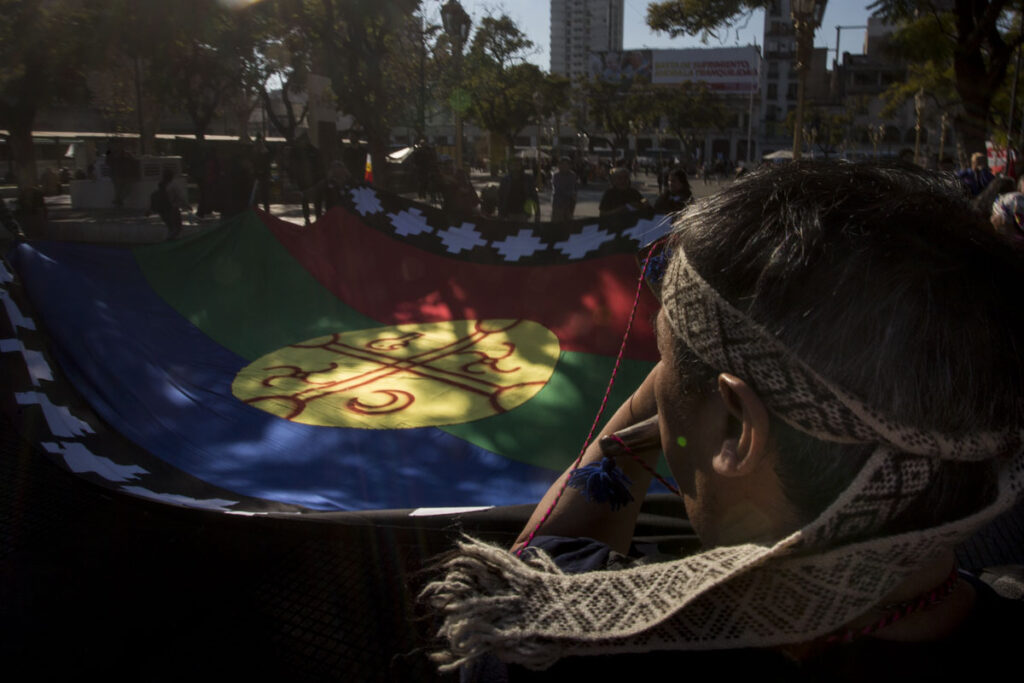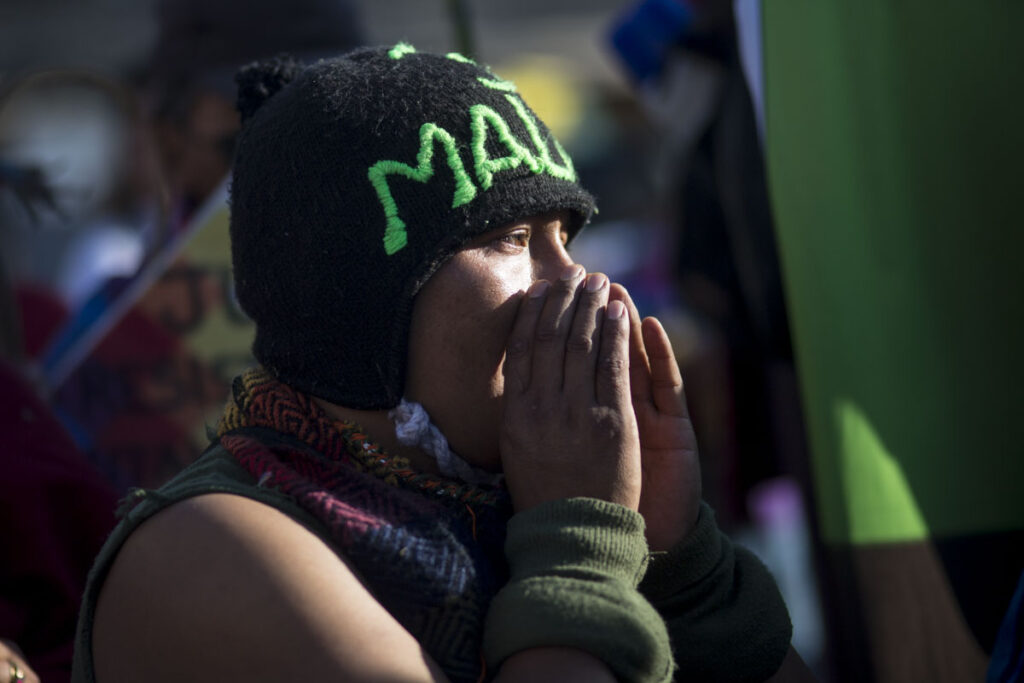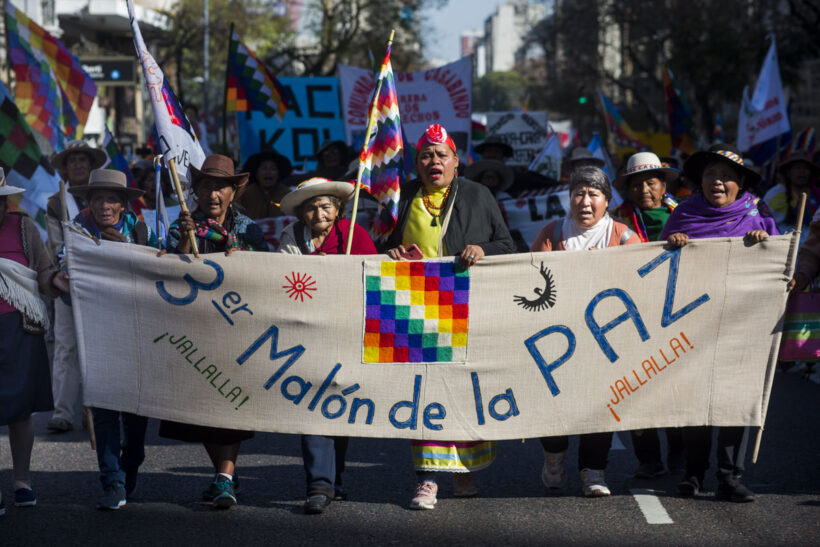In times of elections and short-term promises, indigenous communities are raising fundamental and structural issues. As in 1946, the native peoples mobilised in a new Malón de la Paz to Buenos Aires. The arbitrary constitutional reform of Jujuy, the defence of territories in the face of extractivism and the human right to water.
By: Darío Aranda
It had been a long time, too long, since so many whipalas had been seen in the city of Buenos Aires. The flag of the indigenous peoples, carried by men and women with tanned hands, reminded the capital of the grey asphalt that what is essential is water, clean air, standing forests and unpolluted hills. Seventy-seven years after the first malón (1946), they mobilised over 1500 kilometres in defence of their territories, denounced the constitutional reform of the governor of Jujuy, Gerardo Morales, and also questioned the “false progress” (based on extractivism) promoted by the majority parties in Argentina.
“I’m thirsty, and lithium makes me sick!” they shouted from the massive mobilisation of indigenous communities. The summary of why they prioritise the care of water over the lithium mega-mining being promoted by governments (both provincial and national) and multinationals. It is 9.50am in Plaza Miserere and the indigenous peoples, the social and trade union organisations that accompany them and many people without any organisational affiliation are already there. There are half a dozen indigenous groups performing various ceremonies in tribute to Pachamama, always with thanks and requests for forgiveness.
The indigenous communities of Jujuy are in the majority (Kollas, Atacama, Guaraníes and Ocloyas, among others). The Mapuche and Charrúa people are also present. The chants go on and on: “They say that those of us from the north are quiet / but when they fuck with us, we stand up”.
Women gather in the Plaza Misere to take part in the Third Malón de la Paz in Buenos Aires. Communities from all over the country accompany the communities of the province of Jujuy on the day of the Pachamama, who came to question the political and judicial power about the violent repression unleashed in Jujuy after the reform of the constitution pronounced by the governor Gerardo Morales to facilitate the exploitation of lithium.
 Photo: Nicolas Pousthomis
Photo: Nicolas Pousthomis
Malón de la Paz: a history of mobilisations
In May 1946, during the first Peronist government, a hundred indigenous people from northern Argentina marched on foot from Jujuy to Plaza de Mayo to claim their territories. The unprecedented event went down in history as the “Malón de la Paz”. It was almost two months of walking to shout in Buenos Aires a silenced debt: the lands of the native people. The story also goes that Juan Domingo Perón’s government cynically put them up in the Hotel de los Inmigrantes and, after protocol meetings, sent them back to Jujuy by train.
Sixty years after that event (in August 2006), under another Peronist government (that of Governor Eduardo Fellner), 120 indigenous communities of Jujuy carried out the “Second Malón de la Paz” (Second Malón of Peace). They walked for a day and a half from the different departments of the province to Purmamarca and demanded that the Governor comply with a court ruling that obliged him to hand over 1.5 million hectares of land to the Kolla and Guaraní peoples.
This Third Malón is mainly motivated by the constitutional reform of the governor and vice-presidential pre-candidate of Juntos por el Cambio, condemned in record time and without consultation. Among other aspects, it imposed limits on social protest, modified the composition of the representation of the Legislative Power and left grey areas regarding the territories of indigenous communities.
Mapuche flag before the Third Malón de la Paz in Buenos Aires. Communities from all over the country accompany the communities of the province of Jujuy on the day of the Pachamama who came to question the political and judicial power about the violent repression unleashed in Jujuy after the reform of the constitution pronounced by the governor Gerardo Morales to facilitate the exploitation of lithium.
Photo: Nicolas Pousthomis
On Saturday morning, June 17, in the tourist town of Purmamarca, the first major repression over the constitutional reform took place. Indigenous peoples were blocking the roads and the provincial police attacked with tear gas and rubber bullets. There were at least four repressions during the day. Dozens were arrested and injured. Despite state violence, the road blockade continued.
On 20 June, a bank holiday for Flag Day, Governor Morales swore in the new Constitution in the provincial capital (San Salvador de Jujuy). There was a massive mobilisation and the state response was, once again, repression for more than five hours, with dozens of people injured and arrested.
The roadblocks, mainly held by indigenous peoples, continued. The native communities organised themselves around an organisational process called the Third Malón of Peace. They set off from Jujuy, passing through Catamarca, Tucumán, Córdoba and Rosario. Finally, they gathered in Plaza Miserere, the same place where the first Malón gathered in 1946.
Argentina – Buenos Aires – 01-08-2023: Arrival on the day of the Pachamama of the third malon de la paz in the city of Buenos Aires to warn about the situation in the province of Jujuy.
Day of Pachamama in cement
At 10.50am the demonstration on Rivadavia Avenue is already organised. It is difficult to estimate how many. But at least five blocks full of people can be seen. The indigenous communities are leading the way. The banner is simple and concrete: “Tercer Malón de la Paz. Jallalla”.
“We are the children and grandchildren of the first maloneros,” explains Victoria Colque, from the indigenous community of Las Chapels in Palpalá, where they work and protect 13,000 hectares. She is, along with two other women, holding a sign that says “the reform is unconstitutional”.
She says that she voted for Gerardo Morales. That she believed him. “He married our rituals, befriended us and… deceived us,” she says angrily. And she raises her voice: “We have left our families, our animals, to come and shout that we will not allow ourselves to be subjugated by Morales. We are going to fight until they drop the reform.
The neighbourhood of Once, full of traders and shoppers, looks with surprise at the mobilisation. The colours of the native peoples are not usually seen in the area (nor in the Federal Capital). Some ask her what the protest is about. Many join in and applaud. Whipalas are waved from some balconies.
“Papa, onion / Morales a la olla”, is the chant that resounds. And then follows a classic: “Five centuries resisting / five centuries of courage / always keeping the essence / it is your essence, it is seed, it is inside us forever / it comes to life with the sun and blooms in the pachamama”.
 Argentina – Buenos Aires – 01-08-2023 : Arrival on the day of the Pachamama of the third malon of peace in the city of Buenos Aires to warn about the situation in the province of Jujuy.
Argentina – Buenos Aires – 01-08-2023 : Arrival on the day of the Pachamama of the third malon of peace in the city of Buenos Aires to warn about the situation in the province of Jujuy.
The pace is slow, but organised. Behind the community are the trade unions (ATE seems to be the most numerous), the social organisations (the Frente Darío Santillán, the Corriente Clasista y Combativa, La Dignidad, the MTL, Barrios de Pie and the UTEP).
It is about ten blocks to the Congress, where more people join in, as if they were waiting for that stop to be part of the malón. Although it is August 1st, the sun makes it seem like spring, and a doña sings with a powerful voice a song that speaks of hills, animals and peaceful life in the Puna.
Callao avenue is jammed. Some honk their horns in support and others (many) honk their horns in disapproval. Nothing new for porteñolandia.
Valeria Cruz lives in Humahuaca, is 34 years old, has four children and this is her first time in Buenos Aires. “We don’t want to be slaves, neither we nor our children. That’s why we took to the roads, that’s why we came here. We have rights as indigenous peoples and there are a lot of people who sell out their country who only want us to clean up their filth. That’s why we say down with reform, up with rights”, she explains.
Women gather in the Plaza Misere to take part in the Third Malón de la Paz in Buenos Aires. On the day of Pachamama, communities from all over the country accompany the communities of the province of Jujuy who came to question the political and judicial power about the violent repression unleashed in Jujuy after the reform of the constitution pronounced by the governor Gerardo Morales to facilitate the exploitation of lithium.

Photo: Nicolas Pousthomis
Another ten blocks and arrival at 9 de Julio. The sikuris do not stop playing. And the loud resounding of “Morales, rubbish / you are the dictatorship”. At the Metrobus stops, many people look on in amazement and many others applaud.
They arrive at the Obelisk at 12.50 pm. Hundreds of other people wait and join them. They walk along Diagonal Norte to the Palacio de Tribunales.
Alicia “Lali” Chalabe, a historic lawyer for indigenous communities in Jujuy, is part of the march. In mid-July, there was a rumour circulating that she was going to be imprisoned: “I was waiting for them (the police) at home. Although there was no reason and I had not been officially notified, it could be. This is how the judiciary in Jujuy operates, it obeys the governor”.
He explains that the constitutional reform has two requests for unconstitutionality. One – filed by indigenous communities and NGOs – in provincial courts. And the second, by the national government in the Supreme Court of the Nation. “In the province, it hasn’t even moved from the front table. It will not move forward. It’s a disgrace. But here, in the Supreme Court, it should move,” he explains.
It is no coincidence that the Third Malón culminated in Plaza Lavalle. Where they began a vigil (with tents) awaiting a response from the country’s highest court.
Mapuche flag in Plaza Misere to participate in the Third Malón of Peace in Buenos Aires. Communities from all over the country accompany the communities of the province of Jujuy on the day of the Pachamama to question the political and judicial power about the violent repression unleashed in Jujuy after the reform of the constitution pronounced by the governor Gerardo Morales to facilitate the exploitation of lithium.
 Photo: Nicolas Pousthomis
Photo: Nicolas Pousthomis
An economic model versus a way of life
Two weeks before the elections, only representatives of the PTS (Partido de los Trabajadores Socialistas) and the Partido Obrero were present at the mobilisation. No politician from the mainstream parties was present at the mobilisation. No surprise: they despise the indigenous peoples and, on the other hand, they want the territories in order to hand them over to extractivism (mega-mining, agribusiness, oil and forestry exploitation, among others). The four presidential candidates of the major parties (Patricia Bullrich, Horacio Rodríguez Larreta, Sergio Massa and Juan Grabois) have confirmed that they want to exploit the lithium in the salt mines of Jujuy, Salta and Catamarca.
The blocks of Rivadavia Avenue are already papered with smiling faces of the candidates. Like a joke of fate, on one side there are images of Jorge Macri in yellow, some of Patricia Bullrich and, on the opposite pavement, the new poster of Sergio Massa, with the light blue colour of the Argentine flag. And with a science fiction phrase: “La patria sos vos. Let’s defend it”.
In the Obelisk, more UTEP (Unión de Trabajadores de la Economía Popular -Grabois’s space-) banners and Eva Perón banners can be seen. Brendan Hogan, a professor from New York University visiting Argentina, asks Tierra Viva: “How are there Peronists in this demand if the same Peronist government is promoting extractivism? Some call it “contradictions”. Others find no explanation.
The United Nations has just warned that the climate crisis has gone up another big step. It is no longer about “climate change” but, because of rising temperatures, about “global warming”. Even so, the presidential candidates with the best chances will be proposing more extractivism.
 Argentina – Buenos Aires – 01-08-2023 : Arrival of the third “malon de la paz” in the city of Buenos Aires on the day of the Pachamama to warn about the situation in the province of Jujuy.
Argentina – Buenos Aires – 01-08-2023 : Arrival of the third “malon de la paz” in the city of Buenos Aires on the day of the Pachamama to warn about the situation in the province of Jujuy.
Hugo Aranea, from the Mapuche Parliament of Río Negro, arrived in Buenos Aires to accompany the Malón de la Paz: “What is happening in Jujuy is what is happening all over the country. Governments and companies that exploit lithium, gold, copper or oil. And they do it with violence. It doesn’t matter what political colour they have. Extractivism is the heart of capitalism, and we indigenous peoples oppose it.
He recalls the disappearance and death of Santiago Maldonado, and the murders of Rafael Nahuel and Elías Garay. In view of the upcoming presidential elections, Aranea defines them: “It is a choice for more of the same or for something worse”. And he affirms that the expectations of the Mapuche people are to achieve greater organisation, more unity with other sectors and more struggle.
Throughout the march, the musical hit that is all the rage in Jujuy is reiterated. An adaptation of the popular song “Quién se ha tomado todo el vino” (by Carlos “la Mona” Jiménez) in a malonera version: “I don’t know what’s going on in this city / I don’t know what’s going on / can’t understand / this government is about to spill out / because it has stolen to the hilt / Tell me I just want to know / Who has stolen all the lithium”.
Mariela Alancay, from the indigenous community of Aguas Blancas (in the Salinas Grandes – an area coveted by mining companies), is the first time she has visited the city of Buenos Aires. And she is proud to have travelled thousands of kilometres to defend her native territory. “Down with reform and up with rights”, reiterates one of the slogans of the mobilisation that has been going on for more than a month. He requested that the President intervene in the province and recalled that the Kolla and Atacama communities had already said no to lithium: “These gentlemen from governments and companies need to understand that we have rights, that we live in this territory, and please understand that water is worth more than lithium. That’s why we are going to continue to stand firm with our decision: No more mining companies!
Women gather in Misere Square to take part in the Third Malón de la Paz in Buenos Aires. Communities from all over the country accompany the communities of the province of Jujuy on the day of the Pachamama, who came to question the political and judicial power about the violent repression unleashed in Jujuy after the reform of the constitution pronounced by the governor Gerardo Morales to facilitate the exploitation of lithium.

Photo: Nicolas Pousthomis
Originally published in Tierra Viva Agency






